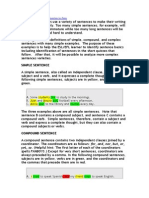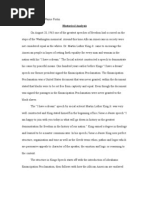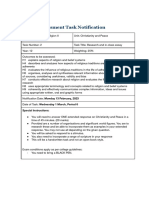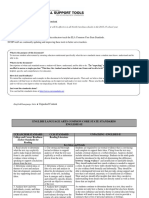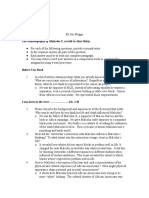I Have A Dream
I Have A Dream
Uploaded by
Juan LarrazabalCopyright:
Available Formats
I Have A Dream
I Have A Dream
Uploaded by
Juan LarrazabalOriginal Title
Copyright
Available Formats
Share this document
Did you find this document useful?
Is this content inappropriate?
Copyright:
Available Formats
I Have A Dream
I Have A Dream
Uploaded by
Juan LarrazabalCopyright:
Available Formats
ANCHOR TEXT | SPEECH
“I Have
a Dream”
Dr. Martin Luther King, Jr.
BACKGROUND
Because speeches are written to be spoken aloud, they are a more fluid SCAN FOR
MULTIMEDIA
form of literature than most other nonfiction. A strong speaker will react to
unspoken signals from his or her listeners and adjust a speech accordingly.
He or she might change words or add whole phrases. This is the case with
Dr. Martin Luther King, Jr., one of the great speakers of the modern age.
The text that appears here represents the speech exactly as it was delivered
by Dr. King on the steps of the Lincoln Memorial.
I
1 am happy to join with you today in what will go down in history
NOTES
as the greatest demonstration for freedom in the history of our
nation.
2 Five score1 years ago, a great American, in whose symbolic
shadow we stand today, signed the Emancipation Proclamation. This
momentous decree came as a great beacon light of hope to millions
of Negro slaves who had been seared in the flames of withering
injustice. It came as a joyous daybreak to end the long night of their
captivity.
3 But one hundred years later, the Negro still is not free. One
hundred years later, the life of the Negro is still sadly crippled by
the manacles of segregation and the chains of discrimination. One
hundred years later, the Negro lives on a lonely island of poverty in
Learning Company LLC.
the midst of a vast ocean of material prosperity. One hundred years prosperity (pros PEHR uh tee)
later, the Negro is still languished in the corners of American society n. good fortune; success
and finds himself an exile in his own land. And so we’ve come here
reserved.
today to dramatize a shameful condition.
Savvas
©Allbyrights
4 In a sense we‘ve come to our nation‘s capital to cash a check.
When the architects of our republic wrote the magnificent words of
the Constitution and the Declaration of Independence, they were
signing a promissory note2 to which every American was to fall heir.
1. score n. twenty. “Five score” is one hundred years.
2. promissory note (PROM ih sawr ee) n. written promise to pay a specific amount.
“I Have a Dream” 261
This note was a promise that all men, yes, black men as well as white
NOTES men, would be guaranteed the “unalienable Rights” of “Life, Liberty,
and the pursuit of Happiness.” It is obvious today that America has
defaulted on this promissory note, insofar as her citizens of color are
concerned. Instead of honoring this sacred obligation, America has
given the Negro people a bad check, a check which has come back
marked “insufficient funds.”
5 But we refuse to believe that the bank of justice is bankrupt. We
refuse to believe that there are insufficient funds in the great vaults
of opportunity of this nation. And so, we‘ve come to cash this check,
a check that will give us upon demand the riches of freedom and the
security of justice.
hallowed adj. (HAL ohd) 6 We have also come to this hallowed spot to remind America of
holy; sacred the fierce urgency of Now. This is no time to engage in the luxury
of cooling off or to take the tranquilizing drug of gradualism. Now
CLOSE READ
ANNOTATE: In paragraphs
is the time to make real the promises of democracy. Now is the time
6 and 7, mark sentences to rise from the dark and desolate valley of segregation to the sunlit
that present two highly path of racial justice. Now is the time to lift our nation from the
contrasting or opposing quicksands of racial injustice to the solid rock of brotherhood. Now is
images or ideas. the time to make justice a reality for all of God’s children.
QUESTION: What do these 7 It would be fatal for the nation to overlook the urgency of
images suggest about the the moment. This sweltering summer of the Negro’s legitimate
speaker’s view of both the discontent will not pass until there is an invigorating autumn of
present and the future? freedom and equality. Nineteen sixty-three is not an end, but a
CONCLUDE: How do these
beginning. And those who hope that the Negro needed to blow
images add urgency to the off steam and will now be content will have a rude awakening if
speaker’s message? the nation returns to business as usual. And there will be neither
rest nor tranquility in America until the Negro is granted his
citizenship rights. The whirlwinds of revolt will continue to shake the
foundations of our nation until the bright day of justice emerges.
8 But there is something that I must say to my people, who stand
on the warm threshold which leads into the palace of justice. In
the process of gaining our rightful place, we must not be guilty of
wrongful deeds. Let us not seek to satisfy our thirst for freedom by
drinking from the cup of bitterness and hatred. We must forever
conduct our struggle on the high plane of dignity and discipline.
We must not allow our creative protest to degenerate into physical
violence. Again and again, we must rise to the majestic heights of
Learning Company LLC.
meeting physical force with soul force.
9 The marvelous new militancy which has engulfed the Negro
community must not lead us to a distrust of all white people,
reserved.
for many of our white brothers, as evidenced by their presence
Savvas
here today, have come to realize that their destiny is tied up with
©Allbyrights
our destiny. And they have come to realize that their freedom is
inextricably bound to our freedom.
10 We cannot walk alone.
11 And as we walk, we must make the pledge that we shall always
march ahead.
262 UNIT 3 • THE LITERATURE OF CIVIL RIGHTS
12 We cannot turn back.
13 There are those who are asking the devotees of civil rights, “When NOTES
will you be satisfied?” We can never be satisfied as long as the Negro
is the victim of the unspeakable horrors of police brutality. We can
never be satisfied as long as our bodies, heavy with the fatigue of
travel, cannot gain lodging in the motels of the highways and the
hotels of the cities. We cannot be satisfied as long as the Negro‘s
basic mobility is from a smaller ghetto to a larger one. We can never
be satisfied as long as our children are stripped of their self-hood
and robbed of their dignity by signs stating: “For Whites Only.” We
cannot be satisfied as long as a Negro in Mississippi cannot vote and
a Negro in New York believes he has nothing for which to vote. No,
no, we are not satisfied, and we will not be satisfied until “justice rolls
down like waters, and righteousness like a mighty stream.”
14 I am not unmindful that some of you have come here out of great
trials and tribulations. Some of you have come fresh from narrow tribulations (trihb yuh LAY
jail cells. And some of you have come from areas where your quest— shuhnz) n. great trouble or
misery
quest for freedom left you battered by the storms of persecution and
staggered by the winds of police brutality. You have been the veterans
of creative suffering. Continue to work with the faith that unearned
suffering is redemptive. Go back to Mississippi, go back to Alabama, redemptive (rih DEHMP tihv)
go back to South Carolina, go back to Georgia, go back to Louisiana, adj. serving to deliver from
sorrow; make amends or
go back to the slums and ghettos of our northern cities, knowing that
pay back
somehow this situation can and will be changed.
15 Let us not wallow in the valley of despair, I say to you today, my
friends.
16 And so even though we face the difficulties of today and
tomorrow, I still have a dream. It is a dream deeply rooted in the
American dream.
17 I have a dream that one day this nation will rise up and live out
the true meaning of its creed: “We hold these truths to be self-evident,
that all men are created equal.”
18 I have a dream that one day on the red hills of Georgia, the sons of
former slaves and the sons of former slave owners will be able to sit
down together at the table of brotherhood.
19 I have a dream that one day even the state of Mississippi, a state
sweltering with the heat of injustice, sweltering with the heat of
oppression, will be transformed into an oasis of freedom and justice. oppression (uh PREHSH uhn)
Learning Company LLC.
20 I have a dream that my four little children will one day live in a n. cruel or unjust treatment
nation where they will not be judged by the color of their skin but by
the content of their character.
reserved.
21 I have a dream today!
Savvas
22 I have a dream that one day, down in Alabama, with its vicious
©Allbyrights
racists, with its governor having his lips dripping with the words of
“interposition” and “nullification”3—one day right there in Alabama
3. “interposition” (ihn tuhr puh ZIHSH uhn) and “nullification” (nuhl uh fih KAY shuhn)
disputed doctrine that a state can reject federal laws considered to be violations of its
rights. Governor George C. Wallace of Alabama used this doctrine to reject federal civil
rights legislation.
“I Have a Dream” 263
little black boys and black girls will be able to join hands with little
NOTES white boys and white girls as sisters and brothers.
23 I have a dream today!
exalted (ehg ZAWL tihd) adj. 24 I have a dream that one day every valley shall be exalted, and
elevated every hill and mountain shall be made low, the rough places will be
made plain, and the crooked places will be made straight; “and the
glory of the Lord shall be revealed and all flesh shall see it together.”4
25 This is our hope, and this is the faith that I go back to the South
with.
CLOSE READ 26 With this faith, we will be able to hew out of the mountain of
ANNOTATE: Mark words despair a stone of hope. With this faith, we will be able to transform
and phrases in paragraphs the jangling discords of our nation into a beautiful symphony of
26–27 that refer to sounds brotherhood. With this faith, we will be able to work together, to pray
or music. together, to struggle together, to go to jail together, to stand up for
QUESTION: How do these freedom together, knowing that we will be free one day.
references help define the 27 And this will be the day—this will be the day when all of God‘s
transformation in society children will be able to sing with new meaning:
King is seeking?
My country ’tis of thee, sweet land of liberty, of thee I sing.
CONCLUDE: What effect do Land where my fathers died, land of the Pilgrim’s pride,
these references have on From every mountainside, let freedom ring!
both the meaning and the
emotional impact of the
28 And if America is to be a great nation, this must become true.
speech? 29 And so let freedom ring from the prodigious hilltops of New
Hampshire.
30 Let freedom ring from the mighty mountains of New York.
31 Let freedom ring from the heightening Alleghenies5 of
Pennsylvania.
32 Let freedom ring from the snow-capped Rockies of Colorado.
33 Let freedom ring from the curvaceous slopes of California.
34 But not only that:
35 Let freedom ring from Stone Mountain of Georgia.
36 Let freedom ring from Lookout Mountain of Tennessee.
37 Let freedom ring from every hill and molehill of Mississippi.
38 From every mountainside, let freedom ring.
39 And when this happens, when we allow freedom to ring, when
we let it ring from every village and every hamlet, from every state
and every city, we will be able to speed up that day when all of God’s
children, black men and white men, Jews and Gentiles,6 Protestants
and Catholics, will be able to join hands and sing in the words of the
Learning Company LLC.
old Negro spiritual:
40 Free at last! Free at last!
Thank God Almighty, we are free at last! ❧
reserved.
41
Savvas
©Allbyrights
4. every valley . . . all flesh shall see it together reference to a biblical passage (Isaiah
40:4–5). King is likening the struggle of African Americans to the struggle of the Israelites.
5. Alleghenies (al uh GAY neez) mountain range that runs through Pennsylvania, Maryland,
West Virginia, and Virginia.
6. Gentiles (JEHN tylz) people who are not Jewish; often refers to Christians.
264 UNIT 3 • THE LITERATURE OF CIVIL RIGHTS
Media Connection
Discuss It How does Dr. King’s delivery contribute to
the power and impact of the speech?
Write your response before sharing your ideas.
“I Have a Dream” SCAN FOR
MULTIMEDIA
Comprehension Check
Complete the following items after you finish your first read.
1. About how much time has passed between the signing of the Emancipation
Proclamation and Dr. King’s speech?
2. When his audience returns home after his speech, what does Dr. King want them to
know about the situation African Americans face?
3. What dream does Dr. King have for his four children?
Learning Company LLC.
4. Notebook Write a summary of Dr. King’s “I Have a Dream” speech.
reserved.
RESEARCH
Savvas
©Allbyrights
Research to Clarify Choose at least one unfamiliar detail from the text. Briefly research
that detail. In what way does the information you learned shed light on an aspect of the
speech?
“I Have a Dream” 265
MAKING MEANING
Close Read the Text
1. This model, from paragraph 8 of the text, shows two sample
annotations, along with questions and conclusions. Close read
the passage, and find another detail to annotate. Then, write a
question and your conclusion.
“I HAVE A DREAM”
ANNOTATE: The use of the word “thirst”
relates to a physical need, something people
must have in order to live.
QUESTION: How does this choice of words
add intensity to King’s argument? ANNOTATE: This phrase
develops the idea of
CONCLUDE: The powerful choice of words
thirst.
shows that freedom isn’t simply something
King and his followers want; it is a basic QUESTION: What does
human need. this phrase suggest
about King’s view of the
struggle for freedom?
Let us not seek to satisfy our
CONCLUDE: The phrase
thirst for freedom by drinking from implies that thirst can
the cup of bitterness and hatred. be quenched in various
ways. King warns his
listeners against taking a
dark path.
Tool Kit 2. For more practice, go back into the text, and complete the
Close-Read Guide and close-read notes.
Model Annotation
3. Revisit a section of the text you found important during your first
read. Read this section closely, and annotate what you notice.
Ask yourself questions such as “Why did the author make this
choice?” What can you conclude?
Cite textual evidence
Analyze the Text to support your answers.
Notebook Respond to these questions.
1. Interpret What does King mean when he refers to the African American
Standards as an “exile in his own land”?
Reading Informational Text
Learning Company LLC.
2. Summarize Explain the comparison King makes between the African
• Cite strong and thorough textual
evidence to support analysis of what American struggle for equality and the cashing of a check.
the text says explicitly as well as 3. Paraphrase (a) When you paraphrase, you restate a text in your
inferences drawn from the text.
reserved.
own words. Paraphrase King’s comments on the urgency of “Now.”
• Determine an author’s point
(b) Speculate To which group of people might King have been directing
Savvas
of view or purpose in a text and
©Allbyrights
analyze how an author uses rhetoric that part of his argument? Explain.
to advance that point of view or
purpose. 4. Evaluate What idea is King trying to convey when he says that
• Analyze seminal U.S. documents “unearned suffering is redemptive”?
of historical and literary significance, 5. Essential Question: How can words inspire change? What have you
including how they address related
themes and concepts. learned about the power of words by reading this speech?
266 UNIT 3 • THE LITERATURE OF CIVIL RIGHTS
ESSENTIAL QUESTION: How can words inspire change?
Analyze Craft and Structure
Argument In a persuasive speech, the speaker tries to convince
listeners to think or act in a certain way. Strong persuasive speakers present
information and supporting evidence clearly and logically so listeners can
follow the reasoning. Persuasive speakers may charged language—language
that appeals to emotions. In addition, they often use rhetorical devices—
patterns of words and ideas that create emphasis and emotion. These
devices include the following forms:
• Parallelism: repeating a grammatical structure or an arrangement of
words to create rhythm and momentum
• Repetition: using the same words frequently to reinforce concepts and
unify the speech
• Analogy: drawing a comparison that shows a similarity between two
unlike things
CITE TEXTUAL EVIDENCE
Practice to support your answers.
Notebook Reread the speech. Then, respond to the questions.
1. In this speech, what is King attempting to persuade his listeners to think or do?
Explain.
2. Use the chart to record at least one example of each type of rhetorical device used
in this speech. Explain why each choice is a good example of that device.
Rhetorical Device Example from the Speech Explanation
charged language
parallelism
repetition
analogy
Learning Company LLC.
3. For each example from your chart, state whether the rhetorical device serves to
reserved.
clarify an idea, stir listeners’ emotions, or both. For each determination, explain your
reasoning.
Savvas
©Allbyrights
4. This speech has become an iconic part of American history. Do you think it deserves
this standing? Support your answer with text evidence and your analysis of King’s
use of rhetoric.
“I Have a Dream” 267
LANGUAGE DEVELOPMENT
Concept Vocabulary
prosperity tribulations oppression
hallowed redemptive exalted
“I HAVE A DREAM”
Why These Words? The six concept vocabulary words are all related to
overcoming a challenge. For example, Dr. Martin Luther King, Jr., speaks of
overcoming the tribulations that African Americans face.
1. How does the concept vocabulary help express both the difficulties and
the possible rewards of the struggle for equality?
2. What other words in the selection connect to this concept?
Practice
Notebook Complete the activities.
1. Use each concept vocabulary word in a sentence that demonstrates
its meaning.
2. Rewrite each of your sentences, replacing the concept vocabulary word
with a synonym. How do your replacements change the meaning of each
sentence?
Word Study
Patterns of Word Changes When added to a base word, the suffix
-tion changes a verb to a noun. In some words, that change requires other
WORD NETWORK
adjustments to spelling. For example, in the word describe, the letters be are
Add interesting words
deleted and replaced with a p plus -tion to get description.
related to civil rights from the
text to your Word Network. 1. Form nouns by adding the suffix -tion to each of the following verbs.
Make any adjustments to spelling that might be required.
a. assume
b. receive
Learning Company LLC.
STANDARDS c. prescribe
Language
• Demonstrate command of the
2. Now that you have changed the verbs into nouns, use them in your own
reserved.
conventions of standard English
grammar and usage when writing or sentences.
Savvas
©Allbyrights
speaking.
• Use parallel structure.
• Spell correctly.
• Identify and correctly use patterns
of word changes that indicate
different meanings or parts of
speech.
268 UNIT 3 • THE LITERATURE OF CIVIL RIGHTS
You might also like
- Lesson Plan Rationale and Evaluation: TESOL MethodologyNo ratings yetLesson Plan Rationale and Evaluation: TESOL Methodology40 pages
- CFodrey-Fall2018FYWS-Bad Ideas About Writing Syllabus-FinalNo ratings yetCFodrey-Fall2018FYWS-Bad Ideas About Writing Syllabus-Final19 pages
- History of England 3rd Ed. - Schultz, Harold John100% (3)History of England 3rd Ed. - Schultz, Harold John436 pages
- RVHS JC1 GP Promos 2020 Paper 1 Sample Essays - AQsNo ratings yetRVHS JC1 GP Promos 2020 Paper 1 Sample Essays - AQs66 pages
- Central Themes of The Pokémon Franchise and Why They Appeal To HumansNo ratings yetCentral Themes of The Pokémon Franchise and Why They Appeal To Humans11 pages
- College Persuasive Essay Example Physical Education Is Vital For AllNo ratings yetCollege Persuasive Essay Example Physical Education Is Vital For All2 pages
- Bednarek - 2009 - Language - Patterns - and - Attitude (Categories of Attitudes)No ratings yetBednarek - 2009 - Language - Patterns - and - Attitude (Categories of Attitudes)29 pages
- Language and Power - Oxford Research Encyclopedia of CommunicationNo ratings yetLanguage and Power - Oxford Research Encyclopedia of Communication20 pages
- College of Teacher Education: Course DescriptionNo ratings yetCollege of Teacher Education: Course Description7 pages
- Jorge Luis Borges Once Wrote That To Live in A Time of Great Peril and Promise Is To Experience Both Tragedy and Comedy0% (1)Jorge Luis Borges Once Wrote That To Live in A Time of Great Peril and Promise Is To Experience Both Tragedy and Comedy4 pages
- Culture, Identity and Transformation - Culturally Relevant Viewpoint - Grade 9No ratings yetCulture, Identity and Transformation - Culturally Relevant Viewpoint - Grade 911 pages
- Andrew Blair - Annals of The Twenty-Ninth CenturyNo ratings yetAndrew Blair - Annals of The Twenty-Ninth Century793 pages
- Research Who Is Responsible For Romeo and Juliets DeathNo ratings yetResearch Who Is Responsible For Romeo and Juliets Death3 pages
- Multicultural American Literature - LezioniNo ratings yetMulticultural American Literature - Lezioni31 pages
- Initial Running Sheet On Station ElevenNo ratings yetInitial Running Sheet On Station Eleven10 pages
- Quantum Information and Computation - NatureNo ratings yetQuantum Information and Computation - Nature10 pages
- Elements of News: Ryan Mccallum Buffalo High School Buffalo, MinnesotaNo ratings yetElements of News: Ryan Mccallum Buffalo High School Buffalo, Minnesota22 pages
- Incomplete or Missing Participial PhrasesNo ratings yetIncomplete or Missing Participial Phrases14 pages
- Salwan Public School, Gurugram: Session: 2023 - 2024No ratings yetSalwan Public School, Gurugram: Session: 2023 - 20244 pages
- Chapter 3 - LOCAL AND GLOBAL COMMUNICATION IN A MULTICULTURAL SETTING100% (1)Chapter 3 - LOCAL AND GLOBAL COMMUNICATION IN A MULTICULTURAL SETTING4 pages
- Students' Grammar Mistakes and Effective Teaching StrategiesNo ratings yetStudents' Grammar Mistakes and Effective Teaching Strategies18 pages
- Bics/Calp: Basic Interpersonal Communicative Skills vs. Cognitive Academic Language ProficiencyNo ratings yetBics/Calp: Basic Interpersonal Communicative Skills vs. Cognitive Academic Language Proficiency4 pages
- INGLES BASICO - Modulo 1 - Personal-Information-JobsNo ratings yetINGLES BASICO - Modulo 1 - Personal-Information-Jobs18 pages
- B1 Preliminary For Schools Reading Part 6 Teaching Online Lesson NotesNo ratings yetB1 Preliminary For Schools Reading Part 6 Teaching Online Lesson Notes9 pages
- Adapting Grice's Maxims in The Teaching of Writing: Ron WhiteNo ratings yetAdapting Grice's Maxims in The Teaching of Writing: Ron White8 pages
- The Theory of German Word Order Aldo Scaglione FinereaderNo ratings yetThe Theory of German Word Order Aldo Scaglione Finereader185 pages
- Learn and Talk I - Lesson 49: ©2016 Acadsoc LimitedNo ratings yetLearn and Talk I - Lesson 49: ©2016 Acadsoc Limited5 pages
- Dominican School Manila Diagnostic Test in Language 5 AY 2018-2019 Dominican School Manila Diagnostic Test in Language 5 AY 2018-2019No ratings yetDominican School Manila Diagnostic Test in Language 5 AY 2018-2019 Dominican School Manila Diagnostic Test in Language 5 AY 2018-20191 page
- ELT Concourse Delta Module One Paper 1 Task 3 Practice 2No ratings yetELT Concourse Delta Module One Paper 1 Task 3 Practice 23 pages
- Future Tenses Simple Suture Future ContinuousNo ratings yetFuture Tenses Simple Suture Future Continuous21 pages
- UHL2422 Assessment 4 Sem 2 2015 2016 Recommendation Report FINAL2 DRAFTNo ratings yetUHL2422 Assessment 4 Sem 2 2015 2016 Recommendation Report FINAL2 DRAFT11 pages
- 1 MS 2nd Generation Sequence Two Me and My Family All Lessons by Khelil Moudjib Arrahmane 2018 2019No ratings yet1 MS 2nd Generation Sequence Two Me and My Family All Lessons by Khelil Moudjib Arrahmane 2018 201924 pages
- Lesson Plan Rationale and Evaluation: TESOL MethodologyLesson Plan Rationale and Evaluation: TESOL Methodology
- CFodrey-Fall2018FYWS-Bad Ideas About Writing Syllabus-FinalCFodrey-Fall2018FYWS-Bad Ideas About Writing Syllabus-Final
- RVHS JC1 GP Promos 2020 Paper 1 Sample Essays - AQsRVHS JC1 GP Promos 2020 Paper 1 Sample Essays - AQs
- Central Themes of The Pokémon Franchise and Why They Appeal To HumansCentral Themes of The Pokémon Franchise and Why They Appeal To Humans
- College Persuasive Essay Example Physical Education Is Vital For AllCollege Persuasive Essay Example Physical Education Is Vital For All
- Bednarek - 2009 - Language - Patterns - and - Attitude (Categories of Attitudes)Bednarek - 2009 - Language - Patterns - and - Attitude (Categories of Attitudes)
- Language and Power - Oxford Research Encyclopedia of CommunicationLanguage and Power - Oxford Research Encyclopedia of Communication
- Jorge Luis Borges Once Wrote That To Live in A Time of Great Peril and Promise Is To Experience Both Tragedy and ComedyJorge Luis Borges Once Wrote That To Live in A Time of Great Peril and Promise Is To Experience Both Tragedy and Comedy
- Culture, Identity and Transformation - Culturally Relevant Viewpoint - Grade 9Culture, Identity and Transformation - Culturally Relevant Viewpoint - Grade 9
- Research Who Is Responsible For Romeo and Juliets DeathResearch Who Is Responsible For Romeo and Juliets Death
- Elements of News: Ryan Mccallum Buffalo High School Buffalo, MinnesotaElements of News: Ryan Mccallum Buffalo High School Buffalo, Minnesota
- Salwan Public School, Gurugram: Session: 2023 - 2024Salwan Public School, Gurugram: Session: 2023 - 2024
- Chapter 3 - LOCAL AND GLOBAL COMMUNICATION IN A MULTICULTURAL SETTINGChapter 3 - LOCAL AND GLOBAL COMMUNICATION IN A MULTICULTURAL SETTING
- Students' Grammar Mistakes and Effective Teaching StrategiesStudents' Grammar Mistakes and Effective Teaching Strategies
- Bics/Calp: Basic Interpersonal Communicative Skills vs. Cognitive Academic Language ProficiencyBics/Calp: Basic Interpersonal Communicative Skills vs. Cognitive Academic Language Proficiency
- INGLES BASICO - Modulo 1 - Personal-Information-JobsINGLES BASICO - Modulo 1 - Personal-Information-Jobs
- B1 Preliminary For Schools Reading Part 6 Teaching Online Lesson NotesB1 Preliminary For Schools Reading Part 6 Teaching Online Lesson Notes
- Adapting Grice's Maxims in The Teaching of Writing: Ron WhiteAdapting Grice's Maxims in The Teaching of Writing: Ron White
- The Theory of German Word Order Aldo Scaglione FinereaderThe Theory of German Word Order Aldo Scaglione Finereader
- Learn and Talk I - Lesson 49: ©2016 Acadsoc LimitedLearn and Talk I - Lesson 49: ©2016 Acadsoc Limited
- Dominican School Manila Diagnostic Test in Language 5 AY 2018-2019 Dominican School Manila Diagnostic Test in Language 5 AY 2018-2019Dominican School Manila Diagnostic Test in Language 5 AY 2018-2019 Dominican School Manila Diagnostic Test in Language 5 AY 2018-2019
- ELT Concourse Delta Module One Paper 1 Task 3 Practice 2ELT Concourse Delta Module One Paper 1 Task 3 Practice 2
- UHL2422 Assessment 4 Sem 2 2015 2016 Recommendation Report FINAL2 DRAFTUHL2422 Assessment 4 Sem 2 2015 2016 Recommendation Report FINAL2 DRAFT
- 1 MS 2nd Generation Sequence Two Me and My Family All Lessons by Khelil Moudjib Arrahmane 2018 20191 MS 2nd Generation Sequence Two Me and My Family All Lessons by Khelil Moudjib Arrahmane 2018 2019



